This website uses cookies so that we can provide you with the best user experience possible. Cookie information is stored in your browser and performs functions such as recognising you when you return to our website and helping our team to understand which sections of the website you find most interesting and useful.

12 hours ago
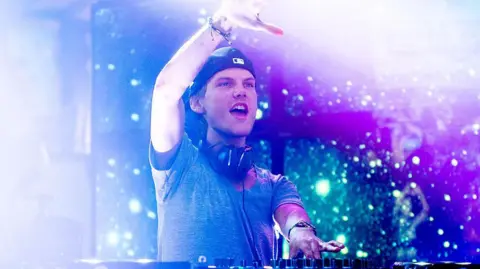 Getty Images
Getty ImagesOn April 20, 2018, the world lost a music superstar, chart-topping DJ Avicii. Aged just 28, he tragically took his own life while on holiday in Oman.
For Klas Bergling, he lost his son, Tim.
"I miss him every minute," Klas Bergling shares over a candid, deeply personal video call. "Of course, I talk to him every day. But," he pauses, "I admit, I get angry at him sometimes. Why did you do it? Why did you leave us?"
Avicii rose to fame as explosively as the bouncing synths on his breakout smash Levels.
The 2011 hit, joyously sampling Etta James' "good feeling" refrain, catapulted the then 22-year-old Swede to pop superstardom.
Over the next five years, as club dance music evolved into the ubiquitous, chart-topping genre known as EDM, with Levels as its anthem, Avicii became its blond, high-cheekboned poster boy - reportedly earning $250,000 (£180,000) a night on tour.
But at 26, he retired from live shows. In a personal note to fans, he referenced his physical and mental health without detailing the full extent of his struggles, which involved anxiety, pancreatitis, alcohol and painkiller addiction.
Despite a period of recovery - producing music away from the spotlight - Tim continued to struggle with inner demons in his search for existential answers about his life. Two years later, the darkness overcame him a final, fatal time.
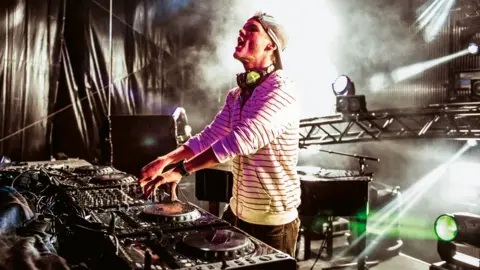 Björn Terring/Avicii Music AB
Björn Terring/Avicii Music ABNow, his family wants people to know Tim beyond the stage lights, releasing a picture book to honour his legacy. It’s part of the the family's efforts through the Tim Bergling Foundation, set up in his memory in 2019, to open up the conversation around the mental health crisis among young people.
Klas, who carefully curated the pictures from Tim's childhood to his superstar life, explains: "We want to help people see beyond the Avicii fame. That's also why we named his posthumous album 'Tim.'"
Reflecting on the deep connection fans still feel, shown by the thousands of letters and memoriam messages on his website, Klas says: “Tim meant a lot to young people - his music, his lyrics, and his person.
"At first, I didn’t understand why, but then a fan said, 'Tim was authentic.' I understood. Many young people relate to that authenticity, his honesty, and struggles."
Millennial star
Tim found fame the millennial way, by posting tracks online. He adopted the name Avicii in 2008, a reference to Buddhist levels of hell after discovering his own name was taken on MySpace.
Signed briefly by BBC Radio 1 DJ Pete Tong after winning a talent competition, he caught the attention of DJ Laidback Luke by posting on his forum.
But Tim struggled with anxiety from a young age, often having catastrophic thoughts and fearing he had cancer. Cannabis use led to fears of madness, disassociation, and derealisation.
Klas recalls Tim having intense "identity questions" during adolescence. After a few meetings with a psychologist, Tim felt better. However, touring exacerbated his anxiety.
A text message in Tim’s 2021 biography revealed Klas' concerns: "Hi Tim, hoping your inspiration is enough for this huge tour, with gigs every day. One needs to pause and breathe a little, but it’s your choice. Kisses and hugs. Your old man."
The hectic schedule took its toll. As Levels garnered nearly 20 million views on YouTube before its official release, Tim's tour included performances across the US, New Zealand, Australia, and Asia, often doing multiple shows in different cities on the same day.
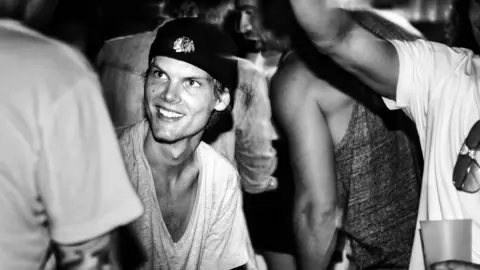 Cim Ek/Avicii Music AB
Cim Ek/Avicii Music ABTo soothe his nerves, Tim turned to alcohol. "I found the magical cure of just having a couple of drinks before going on," he said in the documentary Avicii: True Stories. This dependence grew as he travelled, telling GQ in 2013: "You’re travelling around, you live in a suitcase, you get to this place, there’s free alcohol everywhere."
In 2012, he embarked on a 26-day US tour, which triggered stomach pains from his drinking, leading to hospitalisation and opioid prescriptions for worsening pancreatitis, starting a cycle of health issues and addiction.
The following year in Australia, his pancreatitis returned, but he refused gallbladder removal to avoid cancelling more dates and was prescribed opioids again. His appendix eventually ruptured, forcing surgery.
Klas emphasises the need for systemic change in the music industry, but is careful to avoid individual blame.
"I still think that [record] labels, touring people, agents and managers should really have a driver's licence to show they are fit. This is the way artists should be handled," he asserts.
While he acknowledges some positive changes since Tim's death, noting that "Swedish managers at major labels are more aware nowadays", he stresses that more comprehensive measures are necessary to ensure artist wellbeing.
Survivor’s guilt
Tim’s health problems coincided with his (now Grammy nominated) commercial success. His debut album True, which introduced country sounds, produced hits like Wake Me Up and Hey Brother.
By 2015, his mental state had deteriorated with pill abuse, anger outbursts and erratic behaviour. Despite promising his second album Stories would be his best, his struggles led to delays, on-stage nihilism and clashes with paparazzi.
That summer, Klas and his management knew something had to be done. With a therapist, they planned an intervention in Ibiza. In a Times interview, Klas said he felt he betrayed his son. I ask what he meant and his eyes well.
"You confront your child who is completely unaware of what's going to happen." Tim's distressed reaction was evident. "You see that he realises something is planned behind his back."
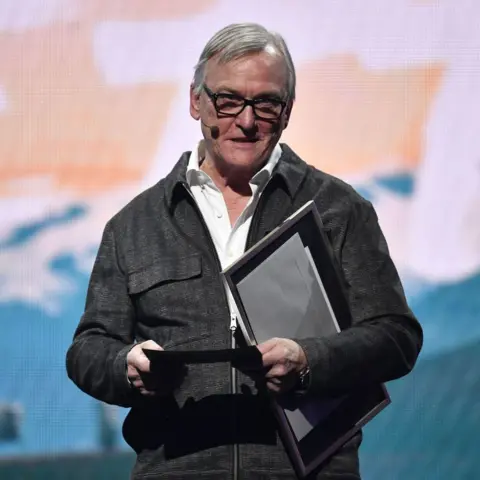 Getty Images
Getty ImagesBut it was necessary, Klas says. "There is no doubt about doing it, but coming to that point is not easy."
Tim, always stubborn, appeared confused, thinking he was being criticised despite working endlessly. After hours of resistance, he agreed to rehab, telling Klas: "I had decided hours ago but just wanted to test you."
Klas smiles, feeling proud of his son's "bravery". After rehab, Tim fought to escape what he described as the "machine that was Avicii" and quit working with his manager.
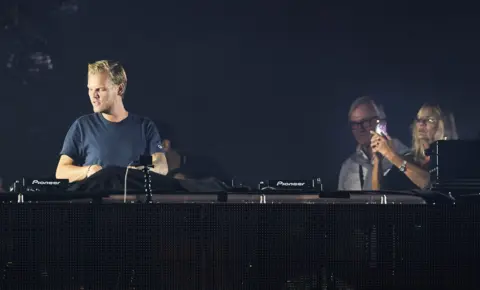 Hillergen Andreas/Aftonbladet/IBL Bildbyrå
Hillergen Andreas/Aftonbladet/IBL BildbyråThe Avicii: True Stories documentary, completed before his death, depicted Tim on a beach, apparently at peace no longer touring. The reality of his suicide had to be added as a jarring post-script.
Klas admits the grief is compounded by the fact that "my wife and his brothers and sister were glad that he was improving in many ways."
It "may sound contradictory, but that's the way it was - he was improving".
Klas explains guilt is "such a big burden" for survivors, who often ask, "what have I done wrong?" He acknowledges, as therapists have told him, "many times you cannot do anything."
'50-year legacy'
This confusion of loss highlights the universal impact of suicide on those left behind as well as the direct victims. The foundation's funding supported Sweden's new national suicide prevention hotline, with the government working on legislation to better investigate suicide. It is part of Klas’ 50-year plan to cement his son’s legacy.
At a tribute concert, Klas promised to push suicide up the political agenda. "We tried to get as many young people there as possible, as well as politicians.” Klas recalls.
"One of the most impactful moments was a big group of parents coming up on stage who had lost their children to suicide. It was such a strong moment."
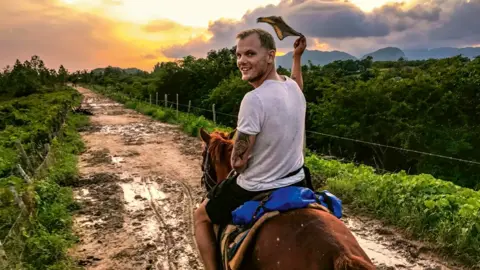 Private/Avicii Music AB
Private/Avicii Music AB"The most important thing is to break the stigma facing young people. [With] a war-torn, unstable world facing the next generation, that’s where I think we can be useful," he says.
Since Tim’s death, Stockholm's arena has been renamed the Avicii Arena, and Together for a Better Day concerts continue in his memory.
Reflecting on Tim's enduring influence, Klas says: "Even if he's not with us any more, he is still very much with us."
Avicii: The life and music of Tim Bergling will be published by Max Ström on 13 June.



 Africana55 Radio
Africana55 Radio 

